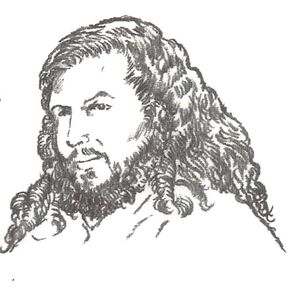Difference between revisions of "Karl Edward Wagner"
| (One intermediate revision by the same user not shown) | |||
| Line 1: | Line 1: | ||
| + | [[File:Karl Edward Wagner. Drawing by Charlie Williams.jpg|thumb|right|Karl Edward Wagner. Drawing by Charlie Williams]] | ||
(1945 -- 1994) | (1945 -- 1994) | ||
| Line 17: | Line 18: | ||
* 1983 -- [[TusCon 10]], [[Karl Edward Wagner Award|British Fantasy Awards Special Award]] | * 1983 -- [[TusCon 10]], [[Karl Edward Wagner Award|British Fantasy Awards Special Award]] | ||
* 1984 -- [[MystiCon III]], [[MC]] at [[DeepSouthCon 22]] | * 1984 -- [[MystiCon III]], [[MC]] at [[DeepSouthCon 22]] | ||
| − | * 1985 -- [[Chimeracon]] | + | * 1985 -- [[Chimeracon]], [[Roc*Kon 9]] |
* 1986 -- [[Hexacon 9]] | * 1986 -- [[Hexacon 9]] | ||
* 1987 -- [[13th World Fantasy Convention]] | * 1987 -- [[13th World Fantasy Convention]] | ||
Latest revision as of 12:05, 25 January 2022
(1945 -- 1994)
Karl Edward Wagner was an award-winning American writer, poet, editor, and publisher of SF, fantasy, and horror. He was born in Knoxville, Tennessee, and originally trained as a psychiatrist.
As an editor, he created a three-volume set of Robert E. Howard's Conan the Barbarian fiction, and edited the long-running The Year's Best Horror Stories series. His Carcosa publishing house issued four volumes of the best stories by some of the major figures of the Golden Age pulps. He is possibly best known for his creation of the long-running series of stories featuring Kane, the Mystic Swordsman.
Collections of his stories include Where the Summer Ends ( 2012) and Walk on the Wild Side (2012).
In 1997, the British Fantasy Society named their British Fantasy Awards Special Award in his honor.
Awards, Honors and GoHships:
- 1978 -- SF-Comics Minicon, Phoenix Award at DeepSouthCon 16
- 1979 -- BYOB-Con 9, Nutria Con '79
- 1980 -- MC at Fantasycon VI
- 1981 -- 7th World Fantasy Convention
- 1982 -- DeepSouthCon 20
- 1983 -- TusCon 10, British Fantasy Awards Special Award
- 1984 -- MystiCon III, MC at DeepSouthCon 22
- 1985 -- Chimeracon, Roc*Kon 9
- 1986 -- Hexacon 9
- 1987 -- 13th World Fantasy Convention
- 1988 -- Kubla Khansequences
- World Fantasy Award
| Person | 1945—1994 |
| This is a biography page. Please extend it by adding more information about the person, such as fanzines and apazines published, awards, clubs, conventions worked on, GoHships, impact on fandom, external links, anecdotes, etc. See Standards for People and The Naming of Names. |
